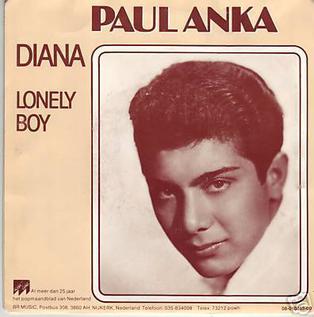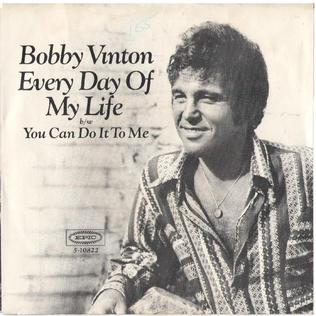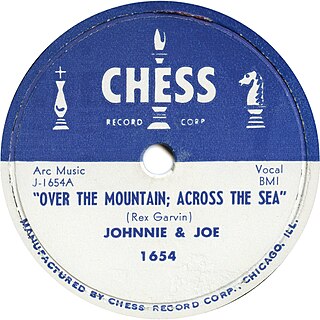Related Research Articles

Stanley Robert "Bobby" Vinton is an American former singer, who also hosted his own self-titled TV show in the late 1970s. As a teen idol, he became known as "The Polish Prince", as his music paid tribute to his Polish heritage. One of his most popular songs is "Blue Velvet" which reached No. 1 on the Billboard Hot 100 in 1963, No. 1 in Canada, and number 2 in the UK in 1990.
"Too Young" is a popular song, with music written by Sidney Lippman and lyrics by Sylvia Dee. A recording of the song was released by Nat King Cole in 1951, which reached No. 1 in the United States and became the best-selling song of the year. Another successful version was released by Donny Osmond in 1972.
"Tell Me Why" is a popular song written by Marty Gold with the lyrics by Al Alberts. The song was published in 1951.

"Diana" is a song written and first performed by Paul Anka, who recorded it in May 1957 at Don Costa’s studio in New York City. Anka stated in his autobiography that the song was inspired by a girl named Diana Ayoub, whom he had met at his church and community events, and had developed a crush on. Session musicians on the record included George Barnes (musician) playing lead guitar, Bucky Pizzarelli playing the "Calypso" riff on guitar, Irving Wexler on piano, Jerry Bruno on bass, and Panama Francis on drums. The song was recorded in May 1957 at RCA Studios in New York. Backup singers included Artie Ripp.

"Take Good Care of My Baby" is a song written by Carole King and Gerry Goffin. The song was made famous by Bobby Vee, when it was released in 1961.
"Blue Velvet" is a popular song written and composed in 1950 by Bernie Wayne and Lee Morris. A top 20 hit for Tony Bennett in its original 1951 version, the song has since been re-recorded many times, with a 1963 version by Bobby Vinton reaching No. 1.
"To Know Him Is to Love Him" is a song written by Phil Spector, inspired by words on his father's tombstone, "To Know Him Was to Love Him." It was first recorded by the only vocal group of which he was a member, the Teddy Bears. Their recording spent three weeks at No. 1 on the Billboard Hot 100 chart in 1958, while reaching No. 2 on the UK's New Musical Express chart. Peter & Gordon and Bobby Vinton later had hits with the song, with its title and lyrics changed to "To Know You Is to Love You". In 1987, the song was resurrected by Dolly Parton, Linda Ronstadt, and Emmylou Harris, whose Trio recording topped the U.S. country singles chart. The song is in 12/8 time.

"Mr. Lonely" is a song co-written and recorded by American singer Bobby Vinton, backed by Robert Mersey and his Orchestra. The song was first released on Vinton's 1962 album, Roses Are Red.
"Someday You'll Want Me to Want You" is a popular song published in 1944 by Jimmie Hodges. The song became a standard, recorded by many pop and country music singers.

"Roses Are Red (My Love)" is a popular song composed by Al Byron and Paul Evans. It was recorded by Bobby Vinton, backed by Robert Mersey and his Orchestra, in New York City in February 1962, and released in April 1962, and the song was his first hit.
"There! I've Said It Again" is a popular song written and published by Redd Evans and David Mann in 1941. In early 1945, Vaughn Monroe and his Orchestra released Victor 20-1637, which reached the number one position on the Billboard's National Radio Airplay chart for five straight weeks, then no.2 for six more weeks, and a total run of 29 weeks. It finished 1945 as the no. 4 record of the year.

"Ev'ry Day of My Life" is a popular song written in 1954 by Al Jacobs and Jimmie Crane.

Bobby Vinton Sings for Lonely Nights is Bobby Vinton's eleventh studio album, released in 1965. This album was released to capitalize on the success of Vinton's big hit "Mr. Lonely" and his album of the same name by containing only songs that refer to loneliness. There were two singles from this album: "Long Lonely Nights" and Vinton's self-penned "L-O-N-E-L-Y". Cover versions include "Saturday Night ", "All Alone Am I", "Oh, How I Miss You Tonight", "In the Still of the Night", "I'll Walk Alone" and "Have You Ever Been Lonely ".
"Please Love Me Forever" is a song written by John Malone and Ollie Blanchard. The song was originally released by Tommy Edwards in 1958. Hit versions were later released by Cathy Jean and the Roommates in 1960 and Bobby Vinton in 1967.
"Just as Much as Ever" is a song written by Charles Singleton and Larry Coleman. The song was a hit single for Bob Beckham, Nat King Cole, and Bobby Vinton.
"Clinging Vine" is a song released by Bobby Vinton in 1964. The song spent 8 weeks on the Billboard Hot 100 chart, peaking at No. 17, while reaching No. 2 on Billboard's Pop-Standards Singles chart, No. 14 on the Cash Box Top 100, No. 11 on Canada's RPM "Top 40-5s", and No. 9 on Canada's CHUM Hit Parade.
"My Heart Belongs to Only You" is a song written by Frank Daniels & Dorothy Daniels. Bette McLaurin and June Christy both released versions of the song in 1952. In 1953, the song reached No. 27 on Cash Box's chart of "The Nation's Top 50 Best Selling Records", in a tandem ranking of June Christy, Bette McLaurin, these versions were marked as bestsellers.
"L-O-N-E-L-Y" is a song written and sung by Bobby Vinton, which he released in 1965. The song spent 8 weeks on the Billboard Hot 100 chart, peaking at No. 22, while reaching No. 7 on Billboard's Pop-Standards Singles chart, and No. 1 on Canada's "RPM Play Sheet".

"Over the Mountain; Across the Sea" is a song written by Rex Garvin. The song was a hit for Johnnie & Joe in 1957 and Bobby Vinton in 1963.
"He Understands Me" is a song released in 1963 by Teresa Brewer. The song was a hit single for Johnny Tillotson in 1964, retitled "She Understands Me", and Bobby Vinton in 1966, retitled "Dum-De-Da".
References
- 1 2 3 Warner, Jay (2006). American Singing Groups: A History from 1940s to Today , Hal Leonard Corporation. p. 102. Retrieved March 25, 2018.
- 1 2 "This Week's R&B Best Buys", Billboard , July 29, 1957. p. 60. Retrieved March 24, 2018
- 1 2 Leszczak, Bob (2013). Who Did It First?: Great Rhythm and Blues Cover Songs and Their Original Artists , Scarecrow Press, p. 131. Retrieved March 25, 2018.
- ↑ "Top 100 Sides", Billboard , August 26, 1957. p. 88. Accessed October 19, 2015
- 1 2 "Most Played R&B by Jockeys", Billboard , September 16, 1957. p. 58. Accessed October 19, 2015
- ↑ "Top 100 Sides", Billboard , September 30, 1957. p. 50. Accessed October 19, 2015
- ↑ "R&B Best Sellers in Stores", Billboard , August 5, 1957. p. 57. Accessed October 19, 2015
- ↑ "Love Ballads – Clyde McPhatter". AllMusic . Retrieved March 24, 2018.
- ↑ "The Cash Box Top 60 Best Selling Tunes on Records", Cash Box , August 17, 1957. p. 6. Retrieved March 24, 2018.
- ↑ "The Records Disc Jockeys Played Most", Cash Box , September 14, 1957. p. 16. Retrieved March 24, 2018.
- ↑ "The Nation's R&B Top 20", Cash Box , September 7, 1957. p. 50. Retrieved March 24, 2018.
- ↑ Hot 100 - Bobby Vinton Long Lonely Nights Chart History, Billboard.com. Retrieved March 24, 2018.
- ↑ "100 Top Pops", Record World , April 10, 1965. Retrieved March 25, 2018.
- ↑ "Cash Box Top 100", Cash Box , April 10, 1965. p. 4. Retrieved March 24, 2018.
- ↑ Adult Contemporary - Bobby Vinton Long Lonely Nights Chart History, Billboard.com. Retrieved March 24, 2018.
- ↑ "Middle-Road Singles", Billboard , March 27, 1965. p. 64. Accessed October 19, 2015
- ↑ "R.P.M. Play Sheet", RPM Weekly , Volume 3, Ed. 7, April 12, 1965. Accessed October 19, 2015
- ↑ "Folk-Nanny – Frankie Valli & the Four Seasons". AllMusic . Retrieved March 25, 2018.
- ↑ "Like It Is, Like It Was – The Dells". AllMusic . Retrieved March 25, 2018.
- ↑ Hot 100 The Dells Long Lonely Nights Chart History, Billboard.com. Accessed October 19, 2015
- ↑ "Soul Singles", Billboard , August 29, 1970. p. 29. Accessed October 19, 2015
- ↑ "100 Top Pops", Record World , August 22, 1970. Retrieved March 25, 2018.
- ↑ "Top 50 R&B", Record World , August 15, 1970. p. 31. Retrieved March 25, 2018.
- ↑ "Cash Box Top 100", Cash Box , August 8, 1970. p. 4. Retrieved March 25, 2018.